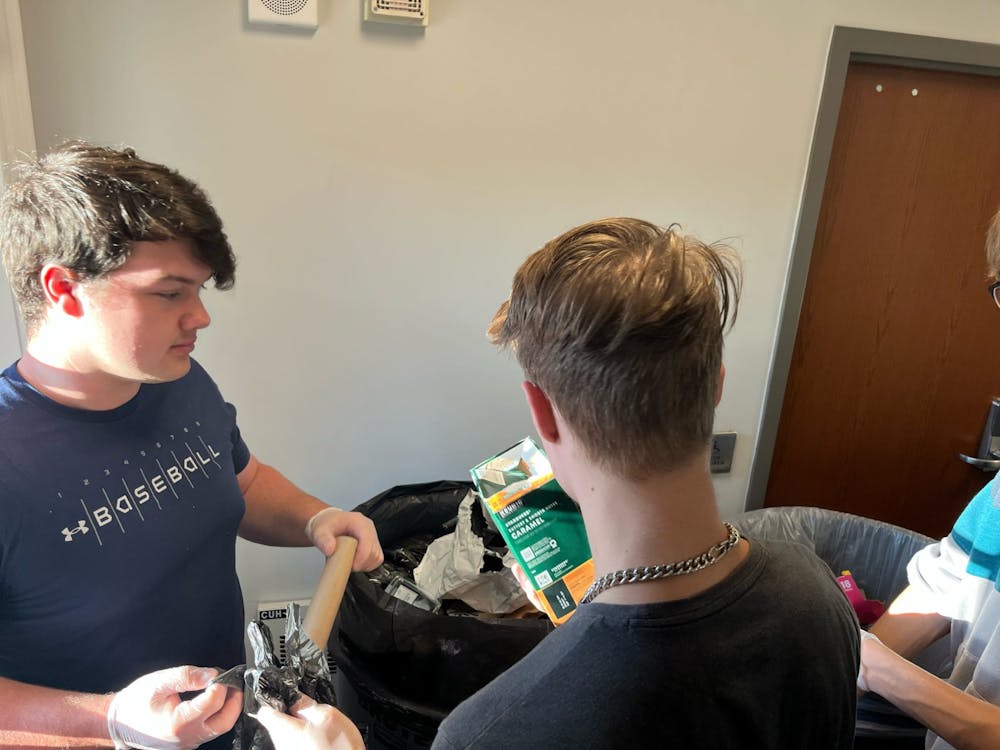Correction on November 29: The Office of Residence Life does not prohibit mace and pepper spray in dorms. University departments gave The Student conflicting information about Miami policy on the matter. We should have taken greater care to ascertain the truth, and we apologize for the error.
The Office of Residence Life is enforcing a policy that requires resident assistants to write up their residents if they are caught with pepper spray in their dorms.
The policy is enforced through Miami University's Student Code of Conduct Weapons section (107), which lists several prohibited weapons that apply to all students attending Miami University, even those who do not live on campus.
The Office of Residence Life (ORL) considers pepper spray to be a weapon under the category of a "dangerous chemical." But the student code of conduct does not explicitly ban the use or possession of pepper spray in dorms or broadly on campus as a whole, Dean of Students Kimberly Moore said in an email to The Miami Student.
ORL officials said they work closely with the Miami University Police Department (MUPD) and Miami's General Counsel's office to make sure they are following university guidelines around what is permitted and prohibited in residential communities. However, MUPD Captain Ben Spilman claims that his department did not have a direct influence on ORL's decision.
"The university's policy against the student code of conduct does not prohibit pepper spray. So, if you've read anything anywhere, it must be specifically in residence halls," said Spilman. "But it's not because of any specific recommendation that the police department has made."
With a total of 13 sexual assaults reported this semester, some students have taken an effort to protect themselves by carrying pepper spray.
Pepper spray has the ability to impair a perpetrator of sexual assault and potentially assist an individual in getting away from their attacker. It can cause temporary blindness and eye pain, burning in the throat, shortness of breath and the inability to speak.
The use of pepper spray in the case of evading sexual assault has been proven successful on campuses, such as Ohio University (OU), which had 12 reports of sexual assault within the first four weeks of their school year. On Sept. 18, while walking back to her dorm at night, a female student at OU was attacked by a stranger who attempted to sexually assault her. The student used her pepper spray and was able to get away from the perpetrator.
At OU, students are permitted to carry pepper spray on campus, and is it not considered a deadly weapon, OU Police Department Lt. Tim Ryan said.
The University of Cincinnati (UC) also allows students to possess pepper spray, but encourages students to be well trained in its usage.
"I would say it's a good thing that it's allowed if a student wanted to carry it and it gave them peace of mind or made them feel safe," UC Police Division of Community Engagement Officer Andrew Mueller said. "We also tell people the potential effects it could have on you...If someone wants to carry it I would say, 'OK, that's great.' Spray it, see what it looks like and see how it sprays."
Enjoy what you're reading?
Signup for our newsletter
Mueller also explained that pepper spray, when utilized, contaminates an entire area and can impair the user as well. He wants those who use it to be trained and aware of the impact pepper spray could have on themselves and their target.
Because students can be written up if caught with pepper spray in their residence halls at Miami, some students feel their right to defend themselves is being taken away from them.
Sophomore and creative writing major Paris Taylor is alarmed by the amount of sexual assaults being reported on campus and has taken precautions to protect herself ever since.
"I am constantly watching my back on campus, especially when I am by myself," said Taylor. "Pepper spray is a form of self-defense, I wouldn't just go around spraying it for no reason."
On Miami's campus, there are multiple student organizations committed to bystander education and sexual assault prevention.
Anondo Banerjee, co-adviser for MARS (Men Against Rape and Sexual Assault), says that in many cases of sexual assault, the perpetrator is someone the survivor knows, and in many cases, the survivor's reaction is to physically freeze.
"A common refrain from sexual assault survivors is that they froze, and they know that if they had pepper spray, the shock from their trust being broken is such a visceral manner stopped them from possibly using those things," said Banerjee. "Things like pepper spray or other stranger danger deterrents aren't always helpful in those cases."
After another rape was reported to the Oxford Police Department on Nov. 18, Taylor feels that now, more than ever, students should be granted the option of whether or not they want to carry pepper spray in residence halls.
"Pepper spray, in my experience, is a useful tool which is a way of protection without causing lethal harm," said Taylor. "It's a defense mechanism and I feel like a safety insurance is being taken away from me."



